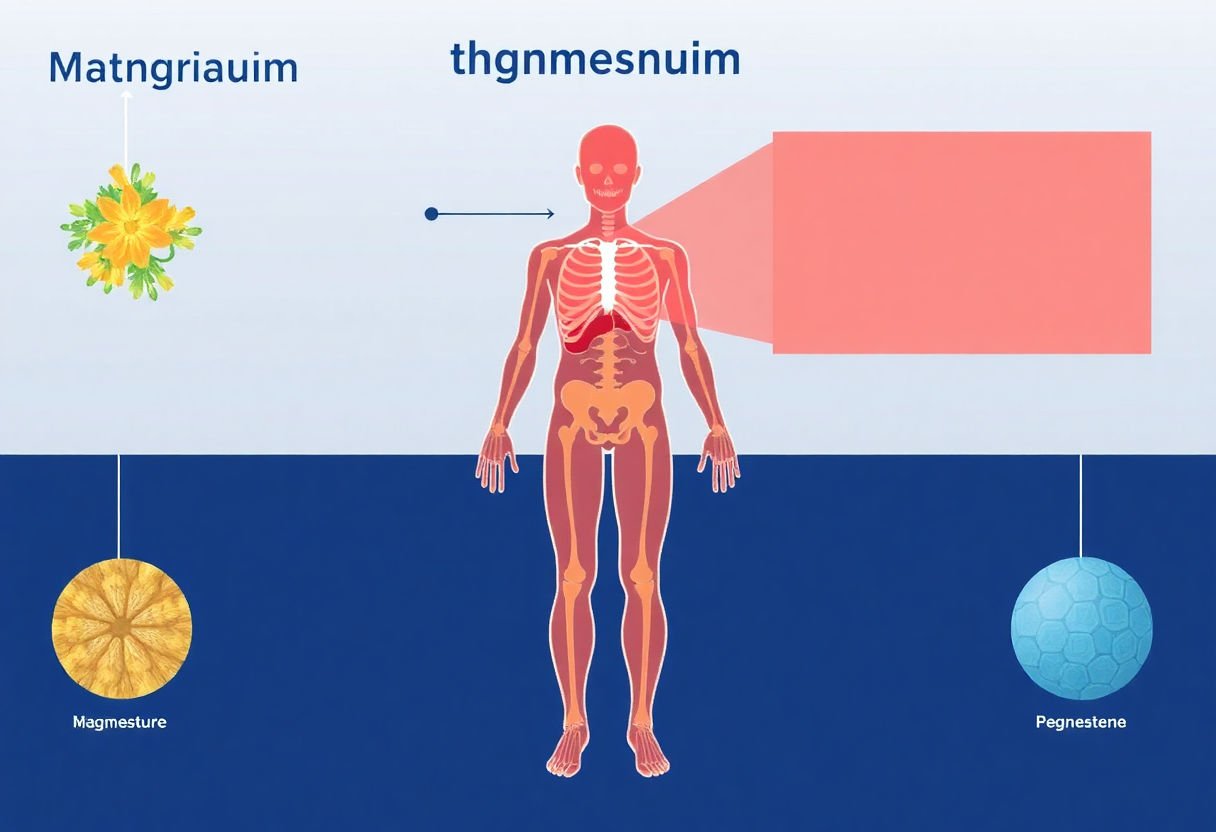In today’s fast-paced world, maintaining optimal energy levels is essential for productivity and well-being. Among various nutrients, magnesium stands out for its crucial role in enhancing energy. The magnesium complex offers a unique blend that supports bodily functions and combats fatigue. This article delves into how magnesium complex boosts both physical and mental performance, reviews its benefits over standard supplements, and provides guidance on choosing the right product. Additionally, it explores dietary magnesium sources, potential side effects, and the profound impact on cognitive functions and athletic endurance, underscoring its importance in daily health routines.
Key Takeaways
- Magnesium complex is essential for enhancing energy levels and supporting various biological functions.
- It plays a crucial role in energy production, aiding in combating fatigue and improving vigor.
- Magnesium complex significantly boosts athletic performance by enhancing muscle function and endurance.
- It supports cognitive functions such as memory and concentration, promoting overall mental health.
- Incorporating magnesium-rich foods or supplements can substantially contribute to overall well-being and vitality.
Understanding Magnesium’s Role in the Body

Magnesium, an essential mineral, plays a pivotal role in numerous physiological processes within the human body. As a cofactor in more than 300 enzymatic reactions, magnesium is indispensable for maintaining optimal health. One of its most crucial roles is in energy production, where it influences the synthesis of adenosine triphosphate (ATP), the primary energy carrier in cells. Without sufficient magnesium, the efficiency of ATP production declines, leading to reduced energy levels.
The mineral is also involved in the regulation of muscle and nerve function. Magnesium stabilizes nerve cells, reducing excitability and helping to prevent spasms. This stabilizing effect is essential for smooth muscle contraction and relaxation, underscoring its importance in both cardiac and skeletal muscle function.
Moreover, magnesium contributes to the maintenance of a strong and healthy cardiovascular system. It aids in regulating heart rhythm and blood pressure, acting as a natural calcium antagonist. This helps in the prevention of hypertension and other heart-related ailments, highlighting the mineral’s role in overall circulatory health.
In addition to these functions, magnesium is imperative for bone health. It aids in the assimilation of calcium into bone, which is vital for maintaining bone density and strength. This function is particularly significant as the body ages, wherein the risk of bone-related diseases increases.
Finally, magnesium impacts the balance of hormones, playing a role in the regulation of insulin, heart palpitations, and fatigue-inducing conditions. By supporting these critical functions, magnesium is not only about physical well-being but also ensures a robust state of mental health.
The Science Behind Magnesium Complex

Magnesium complex is a formulation that combines different forms of magnesium to maximize absorption and effectiveness. Unlike standalone magnesium supplements, the complex typically includes a variety of magnesium compounds such as magnesium citrate, magnesium glycinate, and magnesium oxide, each with unique properties that contribute to overall health.
Composition and Benefits:
-
Magnesium Citrate: Known for its high bioavailability, magnesium citrate is easily absorbed by the body and supports muscle function and nerve health.
-
Magnesium Glycinate: This form is particularly beneficial for enhancing relaxation as it features calming properties and is less likely to cause digestive disturbances compared to other forms.
-
Magnesium Oxide: Although less bioavailable than others, magnesium oxide is effective for relieving indigestion and supporting gut health.
The synergy of these forms in a magnesium complex offers a comprehensive approach to addressing magnesium deficiency, which can manifest as fatigue, weakness, and reduced energy levels.
Why Magnesium Complex?
The body’s magnesium requirements vary based on age, gender, and health conditions. A magnesium complex ensures a broad spectrum of support, catering to the diverse needs of the body. This variety allows for improved cellular energy production by activating ATP, the energy currency of cells. Furthermore, magnesium’s role in stabilizing DNA and protein synthesis cannot be overstated, making it integral to maintaining vitality and reducing fatigue.
By encompassing a range of magnesium types, the complex targets multiple pathways, offering more than what a single-type supplement can achieve. This multifaceted approach is key to enhancing overall well-being and energy readiness.
How Magnesium Complex Boosts Energy Levels

Magnesium complex is a scientifically supported supplement that significantly enhances energy levels, primarily by facilitating several critical biochemical processes. At the core of these processes is magnesium’s essential role in adenosine triphosphate (ATP) production, the body’s primary energy currency. ATP is crucial for fueling cellular activities, and without adequate magnesium, the body cannot efficiently generate or utilize this energy source.
When magnesium binds with adenosine diphosphate (ADP) and inorganic phosphate, it aids in the formation of ATP, thereby enabling optimal energy production. Moreover, magnesium’s involvement in glycolysis, the Krebs cycle, and the electron transport chain exemplifies its multifaceted contribution to energy metabolism.
Apart from its direct impact on energy production, magnesium also plays a crucial role in combating fatigue. By regulating calcium transportation across cell membranes, magnesium prevents excessive calcium accumulation, which can lead to fatigue by causing continuous muscle contraction. This balance is vital for muscle relaxation and reducing the risk of cramps and soreness, especially after strenuous activities.
Furthermore, magnesium supports mitochondrial function. Mitochondria, the powerhouse of the cell, require sufficient magnesium levels for enzyme activation, which in turn ensures efficient energy conversion. An optimal magnesium complex can thus enhance not only physical energy but also improve mental alertness and reduce sensations of tiredness, making it indispensable for sustaining high energy levels in daily life. Emphasizing a magnesium-rich diet or supplementation can be a strategic approach for individuals looking to boost their vitality and stamina effectively.
Magnesium and Physical Performance
Magnesium plays a pivotal role in enhancing physical performance, acting as a key factor in various physiological processes that underpin athletic capability and endurance. This essential mineral contributes to the metabolism of adenosine triphosphate (ATP), which is the primary energy currency of the cells. By aiding in ATP synthesis, magnesium helps in sustaining energy levels during prolonged physical activities.
Athletes and physically active individuals often require higher magnesium levels due to increased physical exertion. Magnesium supplementation is known to have several benefits that directly impact performance:
-
Muscle Function and Relaxation: Magnesium helps in muscle contraction and relaxation, reducing the risk of muscle cramps and spasms. It also decreases the accumulation of lactate, which can cause soreness and fatigue during intense exercise.
-
Oxygen Uptake: Adequate magnesium levels improve the efficiency of oxygen transport in the blood. Enhanced oxygen uptake ensures that muscles receive sufficient oxygen, vital for sustained performance.
-
Electrolyte Balance: As a significant electrolyte, magnesium maintains fluid balance within the body. This is crucial during strenuous activities where dehydration and electrolyte imbalances can adversely affect performance.
Moreover, magnesium facilitates protein synthesis and influences the activity of enzymes involved in energy production, further supporting endurance and recovery. According to certain studies, athletes with optimized magnesium intake have shown improvements in strength and aerobic capacity.
Thus, integrating magnesium into an athletic regimen can be beneficial not only for boosting performance but also for preventing injuries and accelerating recovery, highlighting its importance for those seeking to excel in physical activities.
Mental Benefits of Magnesium Complex
Magnesium complex holds significant promise for enhancing cognitive health, offering a range of mental benefits. One key advantage is its impact on memory and learning. Studies suggest that magnesium can help in synaptic plasticity, a process essential for learning and memory formation. This mineral acts on receptors in the brain that are responsible for neural communication, thereby potentially improving recall and retention.
Another crucial benefit of magnesium is its ability to promote mental clarity and concentration. Magnesium aids in energy production within brain cells, which is fundamental for maintaining focus during demanding cognitive tasks. By ensuring adequate magnesium levels, individuals often experience better concentration and reduced mental fatigue, making it easier to process complex information efficiently.
Furthermore, magnesium plays a vital role in regulating the body’s response to stress, which can have profound implications for mental well-being. It is known to facilitate the production of serotonin, a neurotransmitter that profoundly affects mood and anxiety levels. By stabilizing serotonin levels, magnesium can enhance mood and reduce feelings of stress and anxiety.
Additionally, there is growing evidence that magnesium supplementation may offer protective benefits against cognitive decline. By maintaining ample magnesium concentrations in the brain, there’s a potential to safeguard against age-related and disease-related cognitive deterioration.
The mental benefits of magnesium complex underscore its importance not just for physical vitality, but also for sustaining mental acuity and overall cognitive health. With its multifaceted role in brain function, magnesium proves to be an indispensable nutrient for achieving a harmonious and efficient mind.
Dietary Sources of Magnesium

Magnesium is a crucial mineral found in a variety of foods, making it possible to enhance your magnesium intake naturally. Integrating these foods into your diet can significantly support your energy levels, especially when combined with magnesium complex supplements.
Leafy Green Vegetables
Dark leafy greens such as spinach, kale, and Swiss chard are exceptional sources of magnesium. A single cup of cooked spinach provides nearly 157 mg of magnesium, making greens an essential component of a magnesium-rich diet.
Nuts and Seeds
Almonds, cashews, and pumpkin seeds rank high among magnesium-rich foods. For instance, one ounce of dry-roasted almonds contains approximately 80 mg of magnesium. Incorporating a variety of nuts and seeds into snacks or meals can boost your magnesium intake seamlessly.
Whole Grains and Cereals
Whole grains like brown rice, quinoa, and oatmeal contain significant levels of magnesium. A cup of cooked quinoa has about 118 mg of magnesium, offering a nutritious and versatile option for magnesium enhancement.
Legumes
Beans, lentils, and chickpeas are not only high in fiber and protein but also in magnesium. A cup of cooked black beans provides about 120 mg of magnesium, making legumes a hearty addition to any meal.
Fish
Fatty fish such as salmon and halibut are excellent sources of magnesium along with omega-3 fatty acids. A three-ounce serving of cooked salmon contains around 26 mg of magnesium.
By including these foods in your diet, you can effectively increase your magnesium intake, thus optimizing your energy levels and overall health.
Choosing the Right Magnesium Supplement

When considering a magnesium supplement, it’s important to identify the best formulation to meet specific health needs. Magnesium complex supplements often contain a blend of various forms of magnesium, such as magnesium citrate, magnesium glycinate, or magnesium oxide. Understanding these forms can significantly impact their effectiveness and absorption in the body.
-
Magnesium Citrate: Known for its high bioavailability, magnesium citrate is easily absorbed and is often recommended for those dealing with constipation due to its mild laxative effect.
-
Magnesium Glycinate: This form is celebrated for its calming properties and is less likely to cause digestive upset. It’s ideal for individuals seeking support for anxiety or sleep disturbances.
-
Magnesium Oxide: While it contains a high amount of elemental magnesium, it is less absorbable than other forms and is typically used for addressing short-term issues like heartburn or indigestion.
When selecting a magnesium complex, consider any dietary restrictions or allergies. Some formulations might contain additives or coatings that could cause sensitivity reactions. Additionally, the dosage is paramount. The Recommended Dietary Allowance (RDA) varies based on age and sex, with adult men generally requiring 400-420 mg daily and women 310-320 mg.
Consultation with a healthcare provider is advisable, especially for individuals with existing health conditions or those taking medication that might interact with magnesium supplements. A tailored approach ensures optimal benefits while mitigating any potential risks associated with magnesium intake.
Potential Side Effects and Precautions
When considering magnesium complex supplements, it is crucial to be aware of potential side effects and necessary precautions. Magnesium is generally safe for most individuals when taken at recommended doses, but excessive intake can lead to adverse effects.
Common side effects may include gastrointestinal issues such as diarrhea, nausea, and cramping. To minimize these risks, it is advisable to start with a lower dose and gradually increase it under medical supervision. Some people might experience more severe reactions, including an allergic response, though such occurrences are rare.
Individuals with kidney problems should exercise caution, as impaired kidneys may struggle to excrete excess magnesium efficiently, potentially leading to toxicity. Symptoms of magnesium toxicity encompass muscle weakness, difficulty breathing, and irregular heartbeats, warranting immediate medical attention.
Before incorporating magnesium complex into your regimen, consult with a healthcare professional, especially if you are pregnant, breastfeeding, or currently on medication. Certain medications, like antibiotics and diuretics, may interact with magnesium, affecting either its absorption or the medication’s efficacy.
Quality matters when choosing supplements. Opt for products verified by third-party organizations to ensure they meet purity and potency standards. Additionally, adhering to the recommended dietary allowance (RDA) for magnesium—310-320 mg per day for women and 400-420 mg per day for men—can help prevent overconsumption.
By understanding these potential risks and taking necessary precautions, you can safely enhance your energy levels with magnesium complex supplements, contributing to overall well-being.
Conclusion
In conclusion, the magnesium complex stands as a crucial component in enhancing energy levels and supporting overall well-being. By promoting efficient energy production and mitigating fatigue, this supplement offers a multifaceted benefit for both physical performance and mental acuity. As we continue to explore the pivotal role of magnesium in health, its future applications could lead to advancements in nutritional science and tailored supplementation. For individuals seeking to improve their vitality, incorporating a magnesium complex into daily routines may prove to be both a practical and empowering choice.
Frequently Asked Questions
What is magnesium complex, and how does it differ from regular magnesium supplements?
Magnesium complex is a formulation that combines various forms of magnesium to enhance absorption and efficacy. Unlike standard magnesium supplements, a magnesium complex typically offers broader benefits by leveraging the unique characteristics of each included form.
How does magnesium complex contribute to increased energy levels?
Magnesium complex plays a crucial role in cellular energy production by facilitating the conversion of nutrients into ATP, the body’s primary energy currency. This process is essential for maintaining optimal energy levels throughout the day.
Are there any side effects associated with magnesium complex supplements?
While generally safe for most individuals, magnesium complex can cause mild side effects such as digestive discomfort if taken in large doses. It is advisable to consult with a healthcare professional before beginning supplementation, especially for those with existing health conditions.
Can magnesium complex improve athletic performance?
Yes, magnesium complex can enhance athletic performance by supporting muscle function and reducing fatigue. It helps in the relaxation and contraction of muscles, which is vital for both endurance and recovery.
Is it necessary to take magnesium complex supplements if I already have a magnesium-rich diet?
Even with a diet rich in magnesium, supplementation might be beneficial for individuals with certain health challenges or increased physical demands. Magnesium complex ensures adequate intake levels, especially in cases where dietary sources may not fully meet individual needs.
